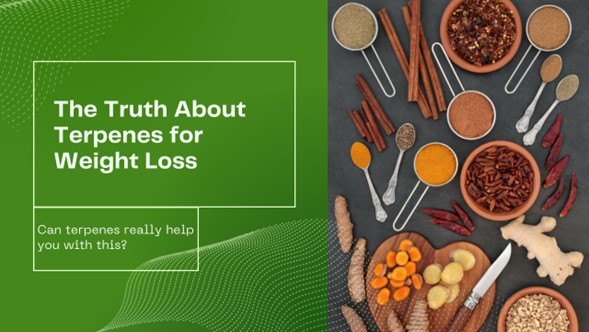
Terpenes are found in many strongly scented plants, which includes cannabis. While terpenes are well known for affecting how things smell and taste, they can also impact human mood and physiology, especially when combined with other chemical compounds, such as cannabinoids.
The synergistic therapeutic effects of cannabinoids and terpenes acting together have been heavily studied. The “entourage effect” of terpenes and cannabinoids working in tandem has been found to promote various changes in mood, mental state, and wellness.
Weight loss is a hot topic. As such, it’s receiving an infusion of interest from the scientific community. Considering cannabis compounds have been found to have specific therapeutic effects on the endocannabinoid system (for anxiety, pain, and mood), it only makes sense to explore the effects of cannabinoids and terpenes for weight loss and weight gain.
Weed and Weight Loss
Anyone who has experienced the joys of getting high knows about the “munchies.” Beyond the recreational experiences, cannabis has long been used therapeutically to stimulate appetite in people struggling with the side effects of cancer treatment (1), as just one example.
Yet, interestingly, while cannabis use often leads to snacking between meals and increased daily caloric intake, cases of high body mass index and obesity actually appear to be lower among cannabis users (2) than non-users.
The real question is, why does weed affect appetite or weight at all? The answer lies in the body’s unique endocannabinoid system, which includes cannabinoid (CB) receptors (3) in the brain, immune system, and elsewhere in the body.
When specific chemicals interact with our CB receptors, the result is appetite stimulation. Certain cannabinoids are particularly good at stimulating CB receptors for increased appetite (namely THC (4)).
However, when these same CB receptors are blocked, the result is appetite suppression instead of stimulation — a medically valued factor in safe, controlled weight loss. This means that, depending on its phytochemical profile, a specific cannabis strain might be referred to as an “appetite stimulant” or an “appetite suppressant.”
The combination of cannabinoids and terpenes present, as well as an individual’s physiology and tolerance, will determine what effect, if any, these strains might have on a weight loss journey.
To be clear, terpenes aren’t a magical weight loss solution. You have to follow through with personal discipline to achieve your weight loss goals. But, a carefully planned and personalized food plan and exercise schedule may see some benefit with a dash of specific cannabinoids and terpenes.
Before we dive into terpenes, let’s look at the main cannabinoid under investigation for weight loss via appetite suppression: THCv.
What’s THCv?
If THCv seems familiar, it’s probably because it starts with three very popular letters: T-H-C. THC (tetrahydrocannabinol) is one of the most popular cannabinoids thanks to its psychoactive effects.
Cannabis higher levels of THC can trigger feelings of euphoria and greater well-being. Some people report clarity of thought with THC, while others enjoy how it acts as a social lubricant.
THCv (tetrahydrocannabivarin) differs from THC in that it typically doesn’t produce psychoactive effects. Instead, it’s frequently advertised as a safe, effective, future pharmacological treatment for obesity (5).
Where does this claim come from? In recent studies, THCv has been shown to decrease appetite, increase satiety, help manage glycemic control and glucose metabolism, and up-regulate energy metabolism.
All of this means THCv can have incredible potential as a clinically useful remedy for weight loss (6) and for managing both obesity and type 2 diabetes.
THCv Cannabis Strains
THCv is found in many popular cannabis strains, including:
- Durban Poison
- Doug’s Varin
- Girl Scout Cookies
- Jack the Ripper
- Malawi Gold
- Pineapple Purps
- Pink Boost Goddess
- Power Plant
- Skunk #1
- Tangie
- Willie Nelson
Some people even call cannabis with a strong THCv profile “diet weed.” This isn’t exactly accurate, but we’ll explore why the title exists in a minute. First, we must address another issue: THCv is a cannabinoid, not a terpene.
So, where do terpenes for weight loss factor in? The answer lies in the synergy between terpenes and cannabinoids: the aforementioned entourage effect (7).
Basically, when you mix THCv with terpenes scientifically known to have an anti-obesity or appetite-suppressing therapeutic effect, you can end up with a product that not only keeps you from getting the munchies but can also help you get healthier.
Do Terpenes Help with Weight Loss?
Terpenes (the main ingredients in essential oils and fragrant compounds) have often been shown to have a relationship with appetite stimulation or suppression. According to the International Journal of Biomedical Sciences, studies of these compounds yielded the following results:
“Among the 40 essential oils and 46 fragrant compounds, 30 samples promoted appetite, 18 samples exhibited appetite-suppressing effects, and 33 did not show any impact on appetite. In addition, five materials exerted different appetite-related effects depending on the experimental conditions.” (8)
Making the Most of Appetite Suppressant Terpenes
How appetite-suppressing terpenes for weight loss work with cannabinoids, diet, and exercise will depend on each individual’s tolerance and their admittedly subjective experience. That said, there is scientific support for many terpenes in relation to appetite suppression as well as obesity control and weight loss.
To be clear, you can’t just eat or drink terpenes to achieve weight loss. Direct consumption isn’t how it works. Appetite-suppressing terpenes don’t cause weight loss like some magic diet pill or shake. You need to use products that safely contain the best terpenes for weight loss support and use only as directed.
Top 5 Terpenes for Weight Loss
Disclaimer: Terpenes are non-polar oil-based hydrocarbons that, in pure form, can be very potent and sometimes volatile, flammable, and even corrosive compounds. For this reason, they should strictly be used by experienced and trained manufacturers, and we advise those unfamiliar with these compounds to exercise caution.
These terpenes aren’t just great for suppressing your appetite. Study results range from a reduction in abdominal fatty deposits to a lowered risk of obesity to better control of blood sugar levels. Adding terpenes to your weight loss plan makes sense from numerous angles.
These are the terpenes that have been studied extensively when it comes to obesity, fatty liver disease, high cholesterol, and diabetes:
1. Humulene
Humulene is found in many spices, including black pepper, cloves, coriander, and ginseng. One study of mice with obesity caused by a high-fat diet found that alcohol extract of clove (AEC) supplementation helped the rodents avoid obesity:
“The major components of AEC were: eugenol (42.27%), acetyl eugenol (29.12%), caryophyllene (15.40%), and humulene (3.22%). Fatty acid synthase (FASN) is a key enzyme for de novo lipogenesis, and it has been suggested as a potential therapeutic target in cancer and obesity… AEC also limited the development of high fat diet (HFD) induced obesity. AEC supplementation significantly reduced body weight and abdominal adipose tissue weight, lowered lipid accumulation in the liver and epididymal adipose tissue compared with the HFD control group… Collectively, our data suggest that FASN inhibitor AEC is a potential therapeutic agent for obesity.” (9)
2. Limonene
Limonene (LIM) has a citrus aroma, as you might expect from a terpene found in oranges, bergamot, and conifers. A study of rats with obesity caused by a high-calorie diet showed that limonene was capable of reducing body weight:
“This study investigated the anti-obesity effect of LIM on the 5′-adenosine monophosphate (AMP)-activated protein kinase (AMPK) signaling pathway in 3T3-L1 adipocytes and high-calorie diet-induced obese rats and confirmed the optimally effective dose of LIM.” (10)
3. Camphene
Camphene has also been the target of research, particularly at the intersection of obesity and fatty liver. One study showed a significant loss of body weight in mice given a high-fat diet plus camphene:
“Camphene supplemented to the high-fat diet of mice at the high dose of 200 mg/kg/day (corresponding to 16 mg/kg/day in humans) reduced a 17% body weight reduction vs controls.” (11)
4. Alpha Pinene
A-pinene is found in pine trees, rosemary, and citrus peels. A study of WSF-7, a chemical derived from α-pinene, showed anti-obesity potential:
“In this study, we reported that WSF-7, a synthetic chemical derived from natural monoterpene α-pinene, is a partial PPARγ agonist. We found that WSF-7 binds directly to PPARγ. Activation of PPARγ by WSF-7 promotes adipogenesis, adiponectin oligomerization and insulin-induced glucose uptake. WSF-7 also inhibits obesity-mediated PPARγ phosphorylation at serine (Ser)273 and improves insulin sensitivity of 3T3-L1 adipocytes.” (12)
5. Myrcene
Myrcene is abundant in hops, fruits like mangoes, and many spices, including cardamom. In a study of the effects of cardamom added to high-carb, high-fat (HCHF) diet-fed rats, there was strong evidence to support that the supplementation could help prevent obesity by curtailing fatty deposits and glucose intolerance:
“Cardamom powder supplementation improved the glucose intolerance significantly (p > 0.05) and prevented the abdominal fat deposition in HCHF diet fed rats.” (13)
While this doesn’t directly prove camphene was the main factor, another study specifically on camphene does seem to support that theory, as decreased insulin resistance can also help fight obesity:
“[Results suggest] camphene prevents HFD-induced hepatic steatosis and insulin resistance in mice; furthermore, these protective effects are mediated via the activation of adiponectin-AMPK signaling.” (14)
Top Cannabis Strains With Weight-Loss Terpenes
Just as some strains of cannabis have higher levels of specific cannabinoids, specific strains have abundant terpenes associated with appetite-suppressing or anti-obesity properties.
For example, popular cannabis strains with in-demand terpenes include:
- White Widow: myrcene, caryophyllene, and pinene
- Northern Lights: myrcene, caryophyllene, and pinene
- AlienOG: myrcene, caryophyllene, and limonene
However, these don’t have THCv. Obviously, if you’re seeking a specific strain to help you avoid the munchies, you want one that combines both a high THCv level and the terpenes that align with your goals.
Since how you’ll react is an individualized experience, what works for a friend or someone on the internet may not work for you.
You’ll have to do a bit of experimentation. Where should you start? These high THCv strains typically include key terpenes associated with anti-obesity and/or appetite suppression:
- Durban Poison and Pink Boost Goddess contain myrcene.
- Jack the Ripper, Tangie, and Pineapple Purps contain myrcene and pinene.
- Willie Nelson contains myrcene and limonene.
- Skunk #1 contains myrcene, pinene, and limonene.
- Power Plant contains myrcene, pinene, and caryophyllene.
- Girl Scout Cookies and Malawi Gold contain myrcene, caryophyllene, and limonene.
- Doug’s Varin contains humulene and caryophyllene.
If you have a cannabis product with a high THCv level but lacking in the terpenes best suited to support weight loss, you may be able to find a vape pen, infused pre-roll, or other product that has these terpenes added.
Lab Effects: Your #1 Source of Natural Botanical and Cannabis Terpenes
When it comes to weight loss, terpenes may not be a magic bullet. However, the right mix of cannabinoids and terpenes can have the potential to support your weight loss journey by fighting factors that cause obesity and helping to prevent your appetite from getting the better of you.
- Searching for terpenes for making cannabis “weight loss support” products? Lab Effects can provide more than 40 true-to-flower cannabis-derived terpene strains on sale, several of which we’ve covered in this blog.
- We only use 100% natural, plant-derived sources. Our terpenes don’t contain artificial additives or chemicals, and you can count on that.
- We guarantee that our terpenes are pure and consistent. You can even customize terpene blends to your precise preferences.
Order cannabis terpenes wholesale today from a reputable company in the U.S. cannabis industry. Lab Effects is cGMP-certified, ISO 9001-certified, HACCP-certified, FDA-registered, and ANAB-accredited.
Sources
- https://pubmed.ncbi.nlm.nih.gov/35360989/
- https://www.ncbi.nlm.nih.gov/pmc/articles/PMC4204468/
- https://pubmed.ncbi.nlm.nih.gov/18426493/#:~:text=CB(1)%20receptors%20are%20present,and%20in%20a%20few%20neurones.
- https://www.ncbi.nlm.nih.gov/books/NBK230711/
- https://pubmed.ncbi.nlm.nih.gov/34242511/
- https://pubmed.ncbi.nlm.nih.gov/33526143/
- https://www.ncbi.nlm.nih.gov/pmc/articles/PMC7324885/
- https://www.ncbi.nlm.nih.gov/pmc/articles/PMC10178777/
- https://pubmed.ncbi.nlm.nih.gov/28726934/
- https://www.ncbi.nlm.nih.gov/pmc/articles/PMC9861755/
- https://www.sciencedirect.com/topics/neuroscience/camphene
- https://pubmed.ncbi.nlm.nih.gov/32115511/
- https://www.ncbi.nlm.nih.gov/pmc/articles/PMC5557534/
- https://pubmed.ncbi.nlm.nih.gov/23818423/


